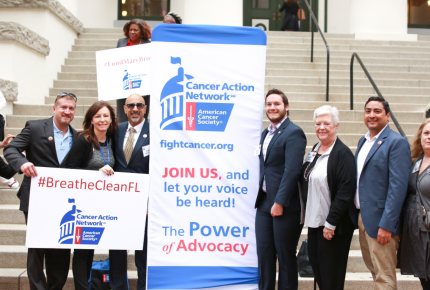Last fall, ACS CAN Florida staff and volunteers joined public health advocates statewide in celebration when Florida voters overwhelmingly supported updating the state’s smoke-free law to include electronic cigarettes. Now, they’re celebrating again as the law is implemented next week. I spoke with the ACS CAN Florida team about their successful campaign; read below about this tremendous win and what it means for our fight against cancer.
Why is July 1st significant in Florida’s fight against cancer?
Beginning July 1st, Florida will fully implement a change added to the state’s constitution that includes a prohibition on using electronic smoking devices in most indoor workplaces. Nearly 70 percent of voters – more than 5 million people – voted ‘yes’ on Amendment 9 through a ballot measure during the November 2018 elections, approving an update to the existing smoke-free law to prohibit e-cigarette use in protected workplaces. Florida voters made it clear that workers and patrons in their state deserve protection from both secondhand smoke and potentially harmful chemicals generated by e-cigarettes. Today, that becomes a reality as Amendment 9 is implemented across the state!
Why is the state’s smoke-free law being updated?
The Florida Clean Indoor Act went into effect in 2002, when Florida voters decided they had a right to breathe clean air, free of secondhand smoke. However, new devices like e-cigarettes are now widely available and pose a health risk by exposing workers and patrons to nicotine and other unknown chemicals. Allowing use of these products in workplaces undermines the protections of the existing smoke-free law. The Clean Indoor Act needed an update to remain as effective as possible at reducing the harm of secondhand smoke in Florida workplaces; so, Amendment 9 was put on the ballot during the November 2018 elections, and voters overwhelmingly supported updating their state’s smoke-free law.
How did this ballot measure process work?
Going to the ballot with this issue was not our original idea, nor is this the preferred way to pass or strengthen a smoke-free law. As Florida’s Clean Indoor Air Act was originally passed as an amendment to the state constitution via a ballot initiative, we had to go through the ballot process to make this change to the law. This particular campaign was pretty unique in terms of political processes: every 20 years in Florida, a group known as the Constitution Revision Commission (CRC) is appointed to review and recommend changes to Florida’s Constitution. The proposal for Amendment 9 was filed by the CRC, passed through their approval process and then put before the Florida voters on the ballot.
How did ACS CAN become a leader in this campaign?
Starting in March 2017, our ACS CAN Florida staff and volunteers traveled to nine public hearings across the state to support what was then called Proposal 65. From there, we launched our comprehensive Breathe Clean Florida campaign, urging first commissioners and then Florida voters to pass this important change. We testified in committee, traveled around the state to the second round of public hearings, waged a well-messaged and focused social media campaign, maximized our grassroots outreach with emails, phone calls and canvassing and implemented a communications strategy that resulted in high-impact media coverage all around the state. Our volunteers carried the message to every corner of the state, resulting in a convincing mandate from the voters of Florida, to protect their right to breathe clean air.
What does this mean for the fight against cancer?
More than 20 million people call Florida home, and an estimated 131,470 will be diagnosed with cancer this year. While indoor workplaces, including restaurants, were already protected by smoke-free policies across the state, prohibiting the use of electronic smoking devices ensures no Floridian will have to put their health at risk just to earn a paycheck, or expose themselves to hazardous aerosol. In short, this is a huge victory for public health in Florida and for ACS CAN’s mission to reduce death and suffering from cancer.

